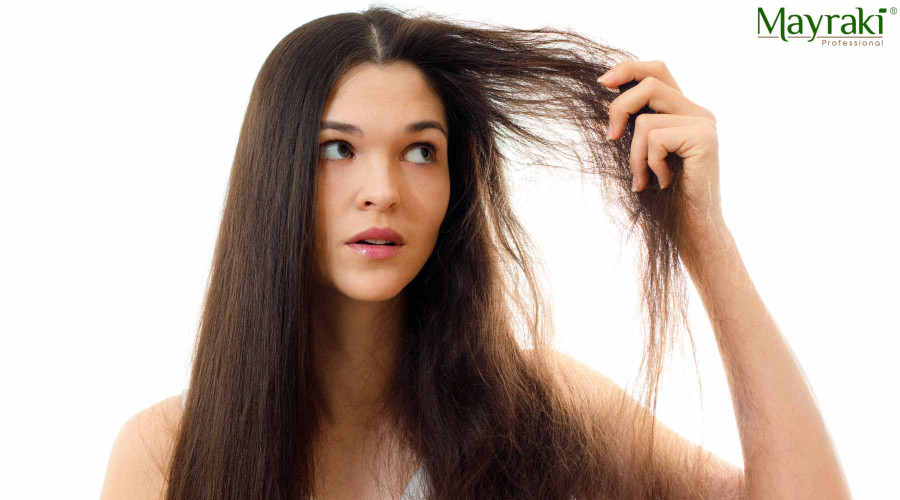What Causes Frizzy Hair?
Jun 07, 2023 | By Maria

Frizzy hair is a common and frustrating hair problem that can leave you longing for a smooth and shiny look. Its unruly nature often leads to a disheveled and unhealthy appearance, making it challenging to manage.
Have you ever noticed that frizz seems to strike at the most inconvenient times? We understand the struggle of unexpectedly encountering bad hair days when you want to look your absolute best. But fear not because this comprehensive guide will explore what causes frizzy hair, debunk common misconceptions, and offer practical tips and remedies to help you tame those unruly tresses.
What is Frizzy Hair?
You will know that you’re experiencing frizzy hair when your locks are extremely difficult to manage, have pesky flyaways everywhere, have a straw-like feel and quality, and feel coarse or dry to the touch. While frizzy hair can be voluminous, it can poof up and give you volume in all the wrong places.
Frizzy hair happens when your hair structure is disturbed, and the cuticles are not sealed. The hair can swell up, the cuticle flares and opens up, and the hair dries out quickly. This is what causes the hair to be unmanageable and unruly.
Frizz can come in all sorts of forms on different hair types. You will know when you have a frizzy hair day vs. a good one on your particular hair type. Some hair types may look and feel smoother and are less likely to experience frizz, while others are more prone to frizziness.
5 Primary Causes of Frizzy Hair
Frizzy hair is caused by various factors, including environmental conditions (humidity, heat, wind), improper hair care practices, heat styling, chemical treatments, and genetic factors. Understanding the causes of frizzy hair is essential for effectively managing hair.
Environmental Factors
Frizz can be an unpredictable and bothersome issue, and you might notice that it tends to come on certain weather days. Humidity, heat, and wind can all cause frizziness in your hair. It becomes crucial to take extra precautions to prevent frizz on days with high humidity, intense heat, or strong winds.
Humidity contributes to frizz by increasing the moisture content in the hair, causing the cuticle to swell and resulting in frizz.
Similarly, heat unseals the cuticle and makes it flare up. Colder weather and cold water, on the other hand, seal the cuticle. You’ll probably notice that in colder, dry weather, your hair feels smoother, and on hot, humid days, your hair is frizzy and unmanageable. Wind can also cause frizziness because it dries out the strands and causes friction.
Hair Care Practices
Improper hair care can also be the cause of frizziness. You may be washing your hair too many times or shampooing your hair with sulfates that dry out the strands. Any hair products with particularly harsh ingredients or chemicals can also cause damage and frizz.
Heat Styling and Frizz
Heat styling is a major cause of frizziness and can lead to long-term damage. We’ve already established that hot weather days can make hair frizzy; it’s the same with heat styling but x10. You’ll expose your hair to high heat that damages the cuticle and makes it flare up, which causes frizz.
Avoid long-term damage to your hair cuticles by lessening heat styling and wearing a heat protectant before styling.
Chemical Treatments
Chemical treatments not only alter the hair structure but can also result in long-term damage. While these treatments may offer aesthetic benefits, they can lead to internal damage, resulting in frizzy and unhealthy hair. The effects of a chemical treatment become more apparent as your hair grows out and the treatment wears off.
Fortunately, there are ways to protect and heal your hair from this damage. Natural protein or keratin treatments are highly effective in sealing the hair cuticle, restoring health, and reducing frizz. By incorporating these organic treatments into your hair care routine, you can nourish and rejuvenate your hair, promoting smoother and more manageable locks.
Genetic Factors
Genetics can also influence your hair texture. As mentioned earlier, some hair types are more or less prone to frizz. Particularly, straight hair has a structure that makes it naturally smoother and less prone to frizziness. Meanwhile, those with wavy and curly hair have a structure that causes hair to naturally bend and twist and have a less smooth cuticle, making hair prone to frizziness and dryness.
Remedies for Managing Frizz
While frizzy hair may be frustrating to deal with, it can easily be controlled with a few changes and steps added to your routine.
You can do this by wearing a heat protectant regularly, using gentle hair products with no harsh chemicals, using a hair mask regularly, and sealing the hair with a keratin treatment with more natural ingredients.
Maintaining overall hair health is crucial in preventing frizzy hair. You can check our article on How to Get Rid of Frizzy Hair for a more comprehensive guide on effectively eliminating frizz.
Don’t Let Frizzy Hair Get You Down
Frizzy hair is something that a lot of people deal with, and you are definitely not alone! Don’t let frizzy hair ruin your mood. It’s a normal occurrence, and there are many ways you can protect your hair from it and get the look that you desire.
It’s important to embrace and love your natural hair texture. Whether you have straight, wavy, or naturally curly hair, your luscious locks are beautiful and deserve to be shown off.




